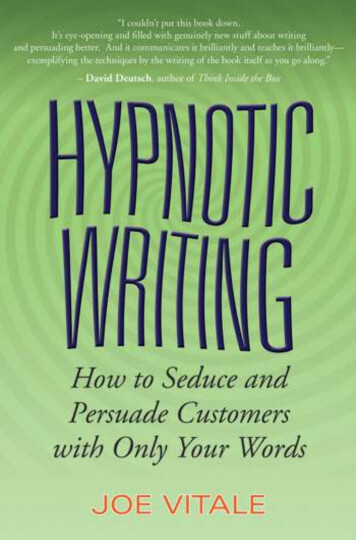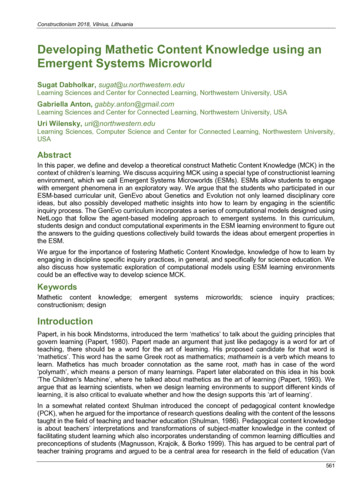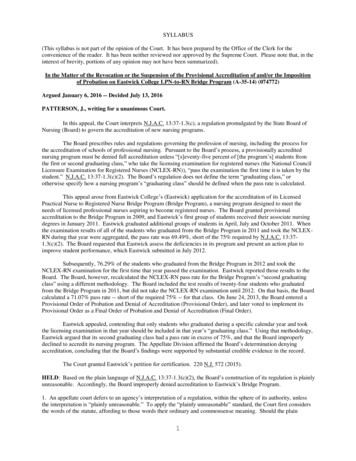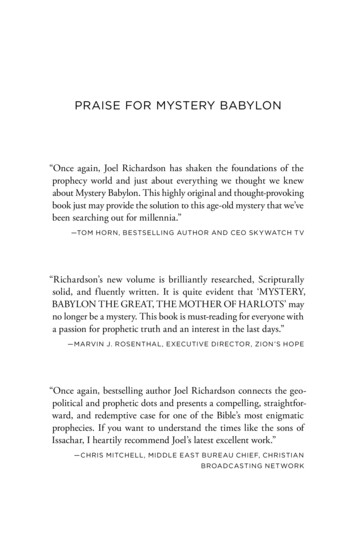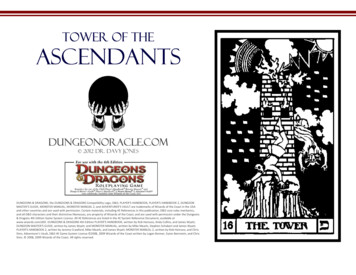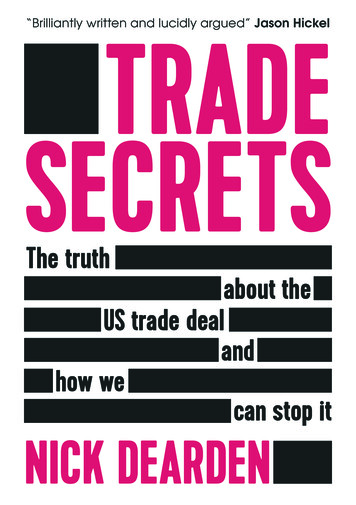
Transcription
“Brilliantly written and lucidly argued” Jason HickelTRADESECRETSThe truthabout theUS trade dealandhow wecan stop itNICK DEARDEN
About the authorNick Dearden is the director of GlobalJustice Now. He has been a campaigneragainst corporate globalisation and for globaleconomic justice for over 20 years. He wasa leading voice in the UK and Europeanmovement against the now‑abandonedEU‑US trade deal (TTIP) and a founderof the UK’s Stop Trump coalition. Heregularly contributes political analysisto publications including The Guardian,Al Jazeera, Open Democracy, Red Pepper andSoundings journal.
TRADE SECRETSThe truth about the US trade dealand how we can stop itNICK DEARDENSecond edition
Global Justice Now works as part of a global movement tochallenge the powerful and create a more just and equal world. Wemobilise people in the UK for change, and act in solidarity withthose fighting injustice, particularly in the global south. Our localactivist groups campaign around the country for a global economywhere people come before profit.Support our campaigning work by becoming a member.Go to globaljustice.org.uk/joinGlobal Justice Now, 66 Offley Road, London SW9 0LS 44 (0)20 7820 4900 offleyroad@globaljustice.org.uk @globaljusticeukGlobal Justice Now Scotland, Thorn House, 5 Rose Street, Edinburgh EH2 2PR 44 (0)131 243 2730 thornhouse@globaljustice.org.uk @globaljusticescPublished by Global Justice Now, with text under a CreativeCommons licence (CC-BY/Attribution 4.0 International)First published August 2020November 2020: revised edition with a new prefaceISBN 978-1-8381488-0-5 (print edition)Printed by Impress Print on recycled paperImages: Tpyxa, Alex Gontar, Nata-Lia, Belish, Ramann(Shutterstock), Wikipedia, Campact, Global Justice NowSponsored by the Rosa Luxemburg Stiftung with funds of theFederal Republic of Germany. This publication or parts ofit can be used by others for free as long as they provide aproper reference to the original publication. The content of thepublication is the sole responsibility of Global Justice Now anddoes not necessarily reflect a position of RLS.
ContentsPreface 91. Why the US trade deal matters 132. Regulations, food and letting big business write the rules 193. The NHS, public services and procurement 314. Corporate courts 415. Freedom for Big Tech 516. Climate change 597. Growth, jobs and workers’ rights 658. Secrecy and democracy 739. How we can win 7910. A new trade agenda 87References 94
9PrefacePresident Biden could still sign a damaging corporatetrade deal with the UKIn November 2020, Donald Trump was defeated in the USpresidential election. At the time of writing, Trump is still toconcede, and the deep social divisions that his presidency pushedto breaking point still remain. But there is at least hope for change,albeit moderate, on issues like immigration, climate change and amore international, coordinated response to coronavirus.When it comes to the US-UK trade deal, things are much lesscertain. That’s because trade deals today are driven by big businessinterests. The demand that we import chlorinated chicken comesfrom US agribusiness. The demand that the NHS pays highercharges for medicines comes from the pharmaceutical industry.The demand to drop our digital services tax comes from SiliconValley’s big tech corporations.While our allies in the United States will doubtless do allthey can to push the Biden administration to control thesecorporate titans, the modern day ‘robber barons’, that will be a
10monumental struggle. And we can’t forget that it was the ObamaBiden administration that pushed the Transatlantic Trade andInvestment Partnership (TTIP), the US-EU trade deal that causedcontroversy across Europe, and that looked very similar to the USdeal currently under discussion.What’s more, the British government has announced that“almost all chapter areas are now in the advanced stages of talks”.They will race to complete the deal, building as much Democratsupport as possible before Summer 2021, when there is a deadlineon the president’s power to hurry a trade deal through Congress.After that point, ratification gets much more difficult.That’s not to say the British government will have an easy ride.Donald Trump had a clear rationale for negotiating a US tradedeal. Trump sees everything as a zero-sum game. He believed theUS gained only when its ‘opponents’ – China and the EU – lost.For Trump, a US-UK trade deal was a means of weakening EUstandards and protections, and of pulling a major economy intothe US orbit.Biden sees things differently. He had no truck with Brexit, andwants to mend fences with Brussels. And he thinks his priorityshould be dealing with the worst pandemic in a century, notnegotiating a trade deal with Britain, which is of marginal interestto his country. What’s more, his strategy for recovery – boosting‘buy America’ policies in government procurement, for instance –runs directly counter to Britain’s interests in this deal. The pitifullysmall gains for Britain’s economy are likely to fall still further.But that might not worry the current British government,which is not interested in a US trade deal because it will createjobs. Indeed, our arguments against a US trade deal are not aboutour overall relationship with the US, or how many goods we tradeper se. They’re about our desire not to import a fundamentallydifferent, more market-driven regulatory model into Britain,replacing the standards and protections we’ve developed overmany years and entrenching corporate power. But of course, that’sexactly what Johnson’s government always wanted.
In that sense, the main negotiation over a US deal is stillbetween Johnson and the British public. It is us, not Biden, whoneed to stop him. For that reason, we can’t put away our placardsyet. Even if Britain has slipped back in the queue, we could still belining up for the chlorine chicken slaughterhouse under the likelyterms of a deal with the US.We can beat this deal, and in so doing throw a huge spannerin the works of this project. That would also make a smallcontribution to an even bigger goal: the transformation of atrade system that currently treats the whole world as a giganticmarketplace, in which our food, healthcare, our rights online – areseen as irritating impediments to be stripped away in the interestsof global capital.Nick Dearden, November 2020.
“The US trade deal isabout importing theAmerican economicmodel, whichenshrines the powerof big business”
131. Why the US tradedeal mattersThere is a part of Britain’s establishment which has alwayslooked to the United States for leadership. For these Atlanticists,Britain’s ‘special relationship’ with the USA is about much morethan a shared history or culture. It goes beyond even the bizarrenostalgia for the power of Empire, though that is part of it. Mostimportantly, this part of Britain’s elite looks longingly at the US as amodel economy in which the market rules, big business can behaveas it sees fit, and rich individuals are free from irritating ‘burdens’like public healthcare and redistributive taxes.For such people, the referendum to leave the European Unionpresented an opportunity to unleash this long-cherished dream.And one important vehicle to achieve this would be a trade dealwith the USA.Trade deals today go well beyond traditional issues like tariffpolicy. For instance, they interfere with how we regulate foodproduction, how we provide public services, how we’re allowedto regulate big business and foreign investment, and how muchwe are charged for our medicines. Trade deals today deeply affectwhat sort of society we live in, promoting a model of free marketeconomics, together with tools to discipline governments that stepaway from this model.The US trade deal is not really about importing more Americanproducts. It’s about importing the American economic andregulatory model. It is not about whether we trade with the US ornot but whether we capitulate to a set of policies that enshrinethe power of the market and big business. A US trade deal is at theheart of what sort of country we become after Brexit.
14Informal talks started with the US administration about a yearafter the Brexit referendum, with formal talks commencing inSpring 2020. They have been held approximately every 6 weeks.The chapters that follow will spell out the consequences ofthis agenda, how a US trade deal would irrevocably change oureconomy and society, and what we can do to stop it. A US tradedeal poses some very specific threats:It would not only undermine our food standards, but also manyother regulations and protections we currently enjoy. It wouldgive big business a greater role in influencing our laws in theirown interests.It would undermine our public services, making it harder to bringservices like the railways back into public ownership, and posinga particular threat to the NHS and the price it pays for life-savingmedicines.It threatens to give US multinational corporations special legalpowers to challenge the policies of the British and devolvedgovernments, including their ability to introduce betterenvironmental and public health policies.It would give Big Tech corporations like Amazon and Facebookmore powers to use and abuse our data, and make it even harderto tax and regulate such corporations.It would threaten our ability to reduce carbon emissions andmeet our climate change targets.In spite of the promises of ‘jobs and growth’ from this deal, itthreatens to undermine workers’ rights.The fact that the deal is being negotiated in secret, and thatelected MPs have no meaningful way of scrutinising the talks orstopping an eventual deal, is an affront to our democratic rights.It’s important to say that in many ways there is nothing particularlyspecial about these proposals for a US-UK trade deal. They are anembodiment of how expansive and enforceable global trade ruleshave become.
15Trade rules have always been about power. Britain built itswealth trading people, forcing China to import opium, andimposing trade rules that devastated the economies of a large partof the world. The impact of this reverberates today.In the last four decades, trade rules have come to embed a‘market knows best’ logic, which has given vast new powers to bigbusiness but left governments less able to protect their citizens orthe environment. Trade deals set the rules of the game, restrictinggovernments from making certain democratic choices that areconsidered ‘unacceptable’ by those who want the market tomake decisions about how society operates. And trade rules areenforceable, meaning they can be used to discipline governmentsthat want to take a different route. Trade rules allow big businessto say ‘sorry, it’s just not possible, it would be against trade rules’.In this way, trade rules have cemented the power of bigbusiness and reduced democratic space. They have helped builda global economy characterised by enormous levels of inequality,both within and between countries, and, by demanding that profitcomes first, have fuelled an environmental catastrophe. Britain hasbeen a champion for such trade rules and after Brexit is preparingto develop more of these deals with countries around the world.So we must place our concerns about a US trade deal within aglobal context, and prepare to do battle not just with the US deal,but with the use of trade rules by our own government to plunderresources and exploit people around the world.This book draws hope and inspiration from previousgenerations of trade activists. These campaigns stopped manyawful trade deals, and today, as trade becomes deeply contentiousaround the world once again, we should pick up their torch and gobeyond simply fighting individual deals to developing an ambitiousagenda to transform the international economy so that it canwork for people and the planet. In the final chapter I set out adescription of what an alternative trade system might look like.None of this is an argument against trade: trade in itself issimply a fact of life. The important question is how we trade. For
16decades, ‘free trade’ has been presented as an unmitigated good,bringing jobs, growth and a wider selection of cheaper products.But this is a half-truth at best. Trade has always had losers as wellas winners, but in recent years the ‘losers’ have been told ‘toobad, it must be your own fault if you’re unable to compete in theglobal economy’.Of course there are many benefits to trade, but unless a societycan control the market – can constrain the power of finance andmultinational corporations, can tax them and build thriving publicservices – those benefits will flow upwards, while those below willexperience job losses, impoverishment and despair. The politicalcrisis we are now living through is an inevitable product of anunsustainable, anti-social economy – an economy that has handedthe major decisions over our lives to a super-rich elite. Trade dealsand trade rules have played no small part in the creation of thiseconomy. People’s anger at this economy is driving the election ofright-wing populists like Donald Trump. But despite sometimestargeting previous “bad deals” in his rhetoric, his view of tradeis little different to his predecessors: it continues to embedprivileges for the elites of the world, only with a more explicitacknowledgment that ‘might is right’ in today’s global economy,and that the US will not hesitate to uphold its own interests at theexpense of its trading ‘partners’.It is possible to build something better, and this book proposeshow we might start on that journey. For us, in Britain, the defeat ofa US trade deal is an essential first step, throwing a major obstaclein the path of our government’s Atlanticist vision, and opening upa debate on what sort of society we want, and the role we play inthe global economy, that is long overdue. From here, we can joinwith campaigners across the world who are fighting against similartrade rules to the ones a US-UK deal would include, and begin torebuild a movement capable of overcoming the ‘market knows best’global economy which has wreaked such chaos on our world.
17A note on the sourcesThree sources are used extensively in this text tohighlight what the British and US administrationswant from a US trade deal. These sources are notindividually footnoted but listed here:The US negotiating objectives1The UK negotiating objectives, which include theBritish rationale for the talks, responses to publicconcerns, an impact assessment and the formalobjectives for the talks2A set of leaked documents related to six roundsof preliminary negotiations held between the EUreferendum in 2016 and the general election in 20193
95%of US baby foods containedtoxic metals in a recent test
192. Regulations, food, andletting big business writethe rules“This isn’t about importing more American products. It’s aboutimporting the American economic model.”Sharon Treat, Institute for Agriculture and Trade Policy4“This administration is not going to compromise. We eitherhave fair access for agriculture or we won’t have a deal.”Robert Lighthizer, United States trade representative5Trade deals today are less about reducing tariffs, already athistorically low levels, and more about regulations and standardsthat supposedly ‘interfere’ with trade. The argument runs like this:I make lightbulbs and I want to export them into another country.The lightbulbs are safe, but they don’t meet the safety standardsof the country I want to export to, so that country blocks importsof my lightbulbs. As an exporter this strikes me as unfair. Itlooks, from that perspective, like a trade barrier dressed up as asafety standard.Modern trade deals spend a lot of effort trying to level (or‘harmonise’) such standards. They do this by judging differentregulations that achieve the same goal as ‘equivalent’. You cantrade such goods because they’re essentially the same.The problem with this approach is that goods are very oftennot ‘equivalent’ at all, and by treating them as such, we riskundermining what are often hard-fought-for environmental,animal welfare and consumer protections. Even lightbulbs are
20not straightforward. In the UK, energy-inefficient incandescentbulbs were phased out years ago, but they are still on the marketin the US, and the Trump administration tried to water standardsdown further.The scope of the problem of ‘harmonising’ standards though isnowhere more evident than in the contentious issue of food.US food standards: a tale of chlorine, pus and antibioticsUS food standards are radically different to Britain’s. USagriculture is dominated by massive corporations, farming onan industrial scale, with intensive use of antibiotics, hormonesand steroids to promote rapid growth of animals and preventillness in what are often extremely unpleasant and unhealthyconditions, along with an excess of chemicals, and allowances forstomach‑churning things to end up in the food we eat.Britain, up to now in the EU, embraces a farm-to-fork methodof food production where sustainability and animal welfare areprotected to some degree and the use of dangerous chemicalsis reduced. It is by no means perfect, but it’s a radically differentapproach to that employed in the US. The final product might ormight not taste similar, and might or might not be as safe (thoughUS food poisoning rates are much higher than European rates), butthe products are certainly not ‘equivalent’.This situation has come about because of the tremendouspower of big business within the American regulatory system.Small farmers have been decimated by this system in the US.Business has created a system in the US where the burden forregulation falls on the state, and business freedom is paramount.They call this a ‘science-based’ approach, and demand itaggressively in trade talks. ‘Science’ sounds good, but in tradedeals it’s a shorthand for a system which allows business todevelop and market products as it wants, and only when harm isproven can action be taken against that produce – an incrediblydifficult task when big business is so well resourced, and thoseharmed often aren’t.
21It contrasts sharply with our approach, the so-called‘precautionary principle’, which takes a cautious approach tohealth risks, puts the burden on business to demonstrate aproduct is safe before it can be sold, and bans foods where thereis a substantial and credible risk to health. Worryingly, both BorisJohnson and his lead trade negotiator to the EU have endorsedthe ‘science-based’ approach, which means throwing caution tothe wind when it comes to embracing technologies like geneticmodification and intensive chemical use.Five food standards under threatThe US is forceful in its demand that US food should be allowedonto British supermarket shelves under a US trade deal – in factsuccessive US representatives have insisted there’s no trade dealwithout it.6 As well as the general principles above, this includessome specific worries for British consumers:It would certainly mean more genetically modified foods.GM ingredients are in the majority of US processed foods butvirtually no European foods, owing to strong British and Europeandisquiet about the technologies involved and the potential controlit gives big business over the food system. Boris Johnson hasclearly indicated he might be willing to agree to US demands onGM foods, saying British food will be “governed by science, notmumbo-jumbo”.7Chlorine chicken, the now-famous symbol of a US trade deal,is poultry washed in pathogen reduction treatments such aschlorine dioxide. But the problem is less the chlorine than whatthe chlorine is hiding. The washes essentially remove bacteriawhich has accumulated over a tortured lifetime. Chickens canbarely move, cluck or eat, never see sunlight, regularly sufferheart attacks because of their unnatural size, and are covered insores.8 What’s more, the washes might actually disguise (ratherthan eliminate9) some pathogens. Food poisoning is a big problemin the US, with studies suggesting that the percentage of peoplewho fall ill with food poisoning annually is up to ten times higher
22in the US than the UK.10 Workers’ rights in the US meat industryare often appalling, with the chemical washes playing a part inthat. Testimony shows the washes are bad for workers – with casesreported of “rashes, burns, destruction of the eye tissue, difficultybreathing, and inflammation of the respiratory system”.11 Leakedpapers from US-UK trade talks reveal that the US has pressuredthe UK to accept chlorinated chicken, even offering to help witha PR exercise to sell chlorinated chicken to the UK public. In fact,the government has tied itself in knots trying to find ways of givinginto US demands while also convincing the public they haven’t –most recently planning to allow chlorine chicken into the Britishmarket but with higher tariffs. As campaigners have pointed out,this is no way to protect decent food standards, not least becausetariffs can be simply lowered over time.12Much other US meat is also produced on an industrial scale,with conditions as bad as those in the chicken sheds. In particular,hormones, steroids and antibiotics are regularly used to makeanimals grow bigger faster (regardless of the impact on theanimal’s ability to walk!) and to prevent them getting ill in theunnaturally close conditions in which they live. Some never seesunlight, or eat grass.13 The use of many of these chemicals is badfor humans too – antibiotic overuse is threatening to make thesedrugs useless as bacteria develop resistance to them, which wouldtake away one of the most crucial tools of modern medicine. USpigs regularly contain ractopamine, which makes pigs collapse,tremble, suffer liver and kidney dysfunction, and even die, andmight well also have serious effects on human health whenconsumed.14 It’s not just Europe that’s worried – over 160 countries,including Russia and China, have banned this dangerous chemical,as well as US pork which contains it.A range of stomach-churning food standards, includingallowing higher levels of pesticides in vegetables (the US allows 72chemicals banned here in Britain, including some responsible forserious harm), higher levels of ‘somatic cells’ in milk (often meaningmore pus, owing to infection in the cow), traces of insects, arsenic
23and even excrement in various foods. A recent report shows thatAmerican apples are allowed to contain 400 times the amount ofsome insecticides linked to serious health conditions, and grapes1,000 times the amount.15 Even baby food carries higher risks inthe US. In the UK, baby food has special standards, including acomplete ban on artificial colours and e-numbers and very lowmaximum levels of pesticides. The US has no specific regulationsfor baby food. A recent test of baby foods in the US found that 95%contained toxic minerals and 73% had arsenic.16A move away from our current system of ‘geographicalindicators’ by which certain products have their local identity andproduction methods protected – think Cornish pasties, MeltonMowbray pork pies, Stilton cheese and Arbroath smokies. Thesystem also sets a quality standard for products sold under theseiconic names. In trade talks to date, the US has “pressed the UKto move away from current EU approach on generic terms”. Thiswould potentially allow American companies to produce and sellersatz ‘Cornish pasties’ themselves.Proponents of allowing these types of food into our marketsoften argue that it’s consumer choice: “If you don’t like it, don’t buyit!” But the argument is disingenuous, not least because the samebig business lobbies pushing to cut food standards are also arguingagainst our labelling standards. Nutritional labelling can literally bea life saver, for instance for people who need to reduce their sugaror salt levels for health reasons – especially things like ‘traffic light’labelling, which make it easy to see at a glance if something is highrisk. But in preliminary discussions (see ‘what the trade papers say’below) the US has already challenged this type of labelling. Suchsystems are a problem for big business, whose processed foodstend to be higher in salt, sugar, fat and GMOs.There’s a deeper problem too. We’ve already seen that tradedeals don’t necessarily directly lower standards. But by forcingproducers into competition with those practising lower standards,they do make higher standards unsustainable. Even with decentlabelling, this competition would force farmers to pressure the
24government to abandon standards here too. Before long, high foodstandards would be the preserve of the few who can afford to shopin niche markets. In this way, modern trade deals force a race tothe bottom in standards and protections.Overall, very few British people support such an agenda. Infact, the overwhelming majority, according to opinion polls, wouldrather have no trade deal with the US than one which deregulatesthe food industry. Asked whether Britain should lower food safetystandards to secure a trade deal with the US or retain currentstandards, only 8% of the public think the UK should lower foodsafety standards, with 82% preferring to keep current standards.17CosmeticsFood is where the threat to our regulations and standards ismost newsworthy, but the issue is much wider. One area wherethe US’ ‘market knows best’ philosophy is most extreme is thecosmetics industry. As with food, some of the chemicals allowed inUS cosmetics seem almost unbelievable, including formaldehydeand coal tar, with even asbestos being found in small amounts inmakeup marketed to children.A core problem is that the US law that regulates cosmeticshasn’t been updated since 1938. This leaves the regulatoryauthority – the Food and Drug Administration (FDA) – with a verylimited ability to intervene in the market to prevent harm, evenserious harm. As the US government admits, “FDA’s oversight ofcosmetics is limited”.18 In the US, businesses do not have to havetheir product’s ingredients approved before it is placed on themarket. Over 1,300 toxic ingredients have been banned from usein cosmetics here, with restrictions of another 500 ingredients.By comparison, only 11 are banned in the US.19 Animal testing ofcosmetics is legal in the US, but banned in Britain.As with food, in the US the burden broadly lies with theregulator to prove something is unsafe, rather than with businessto show it’s safe – and this can only happen after a product isalready on the market. Corporations are not required to tell the
25regulator about their product’s safety, or to disclose manufacturinglocations, or the quantity of ingredients in their product. What’smore, even when a product is found to be in violation of thebasic standards, the regulator does not have the power to recallthose products.20All of this explains the terrible scare stories around cosmeticsin the US. Among the most incredible are traces of the deadlytoxic substance asbestos found in makeup marketed to childrenin major US high street stores. Asbestos ends up in makeupbecause it is often found near talc, a common ingredient in manymakeups, and poor regulation means that asbestos isn’t properlyseparated from the talc.21 In 2019, the FDA confirmed that asbestoshad been found in several products at Claire’s Accessories22, astore aimed at children. Although Claire’s recalled the productsout of an “abundance of caution”, the regulator was only able toissue a ‘safety alert’.23 As one campaigner said: “When it comes tocosmetics regulation, it’s the Wild West consumers end up withunsafe cosmetics staying on store shelves even after harm hasbeen proven”.24There are a number of other chemical substances freelyavailable in US products, but banned here in Britain, including:25Formaldehyde used in hair straightening treatments, nail polishand eyelash glue. Formaldehyde is a known carcinogen.Parabens used in skin and hair products. These have a tendencyto mimic oestrogen in the body, wreaking havoc on yourhormonal system.P-Phenylenediamine derived from coal tar in hair dyes. Thiscan lead to very severe allergic reactions, in severe casescausing blindness.Triclosan in soaps and toothpastes, which is believed to spreadantibiotic resistance.Phthalates in perfumes or shampoo, which can result inlower testicular volume and semen production, and worsesemen quality.
26The Trump administration unleashed a wave of deregulation,attempting to relax even these loose chemical laws, for instancefurther deregulating asbestos. While this was a particular hobbyhorse for Trump, the deregulatory demands of big business areunlikely to disappear under a Biden presidency. Biden has alreadybrought chemical company executives onto his transition team.26Unfortunately, America’s big business community might finda willing partner in the British government, which has itself triedto water down EU chemical laws. The EU is currently lookingat prohibiting the use of titanium compounds in sunscreen, forinstance, on the basis that tiny particles can penetrate the skin andcause cancer. But the EU plans were challenged by Britain evenbefore it left the EU.27 Boris Johnson’s desire for so-called ‘sciencebased’ rather than precautionary standards could well accord withUS objectives in a trade deal.Good regulatory practice and regulatory cooperation‘Good practice’ and ‘cooperation’ sound like positive things. Indeed,there might be nothing wrong with different countries discussingtheir regulations to see whether it makes sense to learn lessonsfrom regulatory practices elsewhere. But, in the context of tradepolicy, ‘regulatory cooperation’ has a specific meaning, which givesbig business new and special powers over the regulatory process.In particular, the US uses ‘good regulatory practice’ as a shorthandfor a deregulatory approach in the name of ‘cutting red tape’.Trade deals ca
corporate titans, the modern day 'robber barons', that will be a . 10 monumental struggle. And we can't forget that it was the Obama- . promoting a model of free market economics, together with tools to discipline governments that step away from this model. The US trade deal is not really about importing more American
